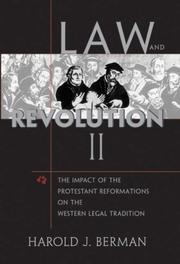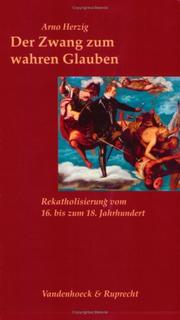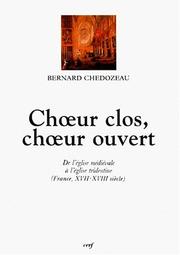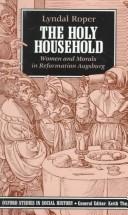| Listing 1 - 5 of 5 |
Sort by
|

ISBN: 0674020863 9780674020863 0674011953 0674022300 9780674011953 9780674022300 Year: 2003 Publisher: Cambridge, Mass. ; London : Belknap,
Abstract | Keywords | Export | Availability | Bookmark
 Loading...
Loading...Choose an application
- Reference Manager
- EndNote
- RefWorks (Direct export to RefWorks)
Harold Berman's masterwork narrates the interaction of evolution and revolution in the development of Western law. This new volume explores two successive transformations of the Western legal tradition under the impact of the sixteenth-century German Reformation and the seventeenth-century English Revolution, with particular emphasis on Lutheran and Calvinist influences. Berman examines the far-reaching consequences of these apocalyptic political and social upheavals on the systems of legal philosophy, legal science, criminal law, civil and economic law, and social law in Germany and England and throughout Europe as a whole. Berman challenges both conventional approaches to legal history, which have neglected the religious foundations of Western legal systems, and standard social theory, which has paid insufficient attention to the communitarian dimensions of early modern economic law, including corporation law and social welfare. Clearly written and cogently argued, this long-awaited, magisterial work is a major contribution to an understanding of the relationship of law to Western belief systems.
Law --- Reformation. --- Protestant Reformation --- Reformation --- Church history --- Counter-Reformation --- Protestantism --- Legal history --- History. --- History --- History and criticism --- Law - Europe - History --- Reformation - Influence --- Christianity and law - History --- Christianity and law --- Influence.

ISBN: 3525013841 9783525013847 Year: 2000 Publisher: Göttingen Vandenhoeck und Ruprecht
Abstract | Keywords | Export | Availability | Bookmark
 Loading...
Loading...Choose an application
- Reference Manager
- EndNote
- RefWorks (Direct export to RefWorks)
Counter-Reformation --- Christianity and politics --- Contre-Réforme --- Eglise catholique --- Catholic Church --- Aspect politique --- History --- Histoire --- Germany --- Austria --- Allemagne --- Autriche --- Church history --- Histoire religieuse --- Counter-Reformation. --- History. --- Influence. --- Contre-Réforme --- Anti-Reformation --- Church renewal --- Reformation --- Christianity --- Church and politics --- Politics and Christianity --- Politics and the church --- Political science --- Catholic Church&delete& --- Influence --- Political aspects --- Counter-Reformation - Germany. --- Christianity and politics - Catholic Church - History. --- Counter-Reformation - Influence.

ISBN: 2204058106 9782204058100 Year: 1998 Publisher: Paris : Les Editions du Cerf,
Abstract | Keywords | Export | Availability | Bookmark
 Loading...
Loading...Choose an application
- Reference Manager
- EndNote
- RefWorks (Direct export to RefWorks)
Architecture and religion --- Architecture et religion --- Choirs (Architecture) --- Church architecture --- Counter-Reformation --- Architecture religieuse --- Bâtiment culturel --- Eglise --- Histoire de l'architecture --- History --- Influence --- 27 <44> "16/17" --- -Church architecture --- -Counter-Reformation --- -Ecclesiastical architecture --- Rood-lofts --- Christian art and symbolism --- Religious architecture --- Architecture, Gothic --- Church buildings --- Anti-Reformation --- Church history --- Church renewal --- Reformation --- Kerkgeschiedenis--Frankrijk--?"16/17" --- -History --- -Influence --- -Kerkgeschiedenis--Frankrijk--?"16/17" --- Ecclesiastical architecture --- Choirs (Architecture) - France --- Church architecture - France - History - 17th century --- Church architecture - France - History - 18th century --- Counter-Reformation - Influence --- ARCHITECTURE RELIGIEUSE --- LITURGIE CHRETIENNE --- FRANCE

ISBN: 0198217692 0198202806 0191675520 9780198202806 Year: 1989 Publisher: Oxford : Clarendon Press,
Abstract | Keywords | Export | Availability | Bookmark
 Loading...
Loading...Choose an application
- Reference Manager
- EndNote
- RefWorks (Direct export to RefWorks)
This is a fascinating study of the impact of the Reformation idea of "civic righteousness" on the position of women in Augsburg. Roper argues that its development, both as a religious credo and as a social movement, must be understood in terms of gender. Until now the effects of the Reformation on women have been viewed as largely beneficial--Protestantism being linked with the forces of progressivism, individualism, and modernization. Roper here argues that such a view of the Reformation's legacy is a profound misreading, and that the status of women was, in fact, worsened by the Reformation. A number of themes are explored: the economic position of women in the household economy; the nature of "civic righteousness" and how it applied a "reform moralism" to the role of marriage and the household; the efforts of civic authority to reform sexual deviance; the attempts to control marriage and the breakdown of marriage; and the role of convents and nuns. The Holy Household is the first scholarly account of how the Reformation affected half of society. It combines sound application of feminist theory with careful, open-ended archival research to advance our understanding of the Reformation, of feminist history, and of the place of women in modern European society.
Reformation --- Women --- Influence. --- Conduct of life --- History --- Social conditions. --- Morale pratique --- Christian church history --- History of civilization --- anno 1500-1599 --- Augsburg --- Human females --- Wimmin --- Woman --- Womon --- Womyn --- Females --- Human beings --- Femininity --- Protestant Reformation --- Church history --- Counter-Reformation --- Protestantism --- Influence --- Social conditions --- Réforme (Christianisme) --- Femmes --- Histoire --- Conditions sociales --- Germany [West ] --- Augsburg (Germany) --- 16th century --- Women - Germany - Augsburg - Social conditions. --- Women - Germany - Augsburg - Conduct of life - History - 16th century. --- Reformation - Influence. --- Femmes et religion --- Augsbourg --- Leon xiii, pape (giacchino pecci), 1810-1903 --- Reforme --- Allemagne --- 16e siecle
Book
ISSN: 16106040 ISBN: 9783465043690 3465043693 Year: 2021 Volume: 320 Publisher: Frankfurt am Main Vittorio Klostermann
Abstract | Keywords | Export | Availability | Bookmark
 Loading...
Loading...Choose an application
- Reference Manager
- EndNote
- RefWorks (Direct export to RefWorks)
Der Begriff "Staat" in seinem modernen Verständnis wurde im deutschsprachigen Reich nicht mit Bezug auf das frühneuzeitliche Alte Reich als Ganzes und erst recht nicht auf die Konsolidierung fürstlicher Macht über Land und Leute gemünzt. Vielmehr stand seine Genese im Zusammenhang mit den erbitterten Konflikten zwischen entstehenden Landständen und Fürsten angesichts der Verwüstungen des Dreißigjährigen Krieges. Die zeitgenössische und auf Luther zurückgehende Polemik gegen verbrecherische Fürsten aufnehmend, sollte Seckendorffs "Teutscher Fürstenstaat" (1656) als vermeintlich bis weit ins Mittelalter zurückreichende Einheit aus Land, Leuten und Gesetzen seine Bewohner durch eigene Rechtsordnung und rechtmäßige Verwaltung (Policey) vor der Inkompetenz und Bosheit der Fürsten schützen. Seit dem letzten Drittel des 17. Jahrhunderts fanden diese Ideen, deren Herausbildung das Buch auf breiter Quellenbasis nachzeichnet, zunehmend auch bei vielen Fürsten und ihren Beratern in evangelischen wie katholischen deutschen Landen Anklang.In the German-speaking Reich, the term "state" in its modern understanding was not coined with reference to the early modern Old Reich as a whole and certainly not with the consolidation of princely power over land and people as its aim. Rather, its genesis was related to the bitter conflicts between emerging estates and princes in the face of the devastations of the Thirty Years' War. Taking up the contemporary polemics against criminal princes dating back to Luther, Seckendorff's "Teutscher Fürstenstaat" (1656) was supposed to protect its inhabitants from the incompetence and wickedness of the princes by means of their own legal system and lawful administration (Policey) as a unit of land, people and laws that allegedly reached far back into the Middle Ages. Since the last third of the 17th century these ideas, the development of which the book traces on a broad source basis, have increasingly found favour with many princes and their advisors in Protestant and Catholic German countries.
943.041 --- 27 <43> "15/17" --- 27 <43> "15/17" Histoire de l'Eglise--Duitsland voor 1945 en na 1989--Moderne Tijd --- 27 <43> "15/17" Kerkgeschiedenis--Duitsland voor 1945 en na 1989--Moderne Tijd --- Histoire de l'Eglise--Duitsland voor 1945 en na 1989--Moderne Tijd --- Kerkgeschiedenis--Duitsland voor 1945 en na 1989--Moderne Tijd --- 943.041 Geschiedenis van Duitsland: Dertigjarige oorlog--(1618-1648) --- Geschiedenis van Duitsland: Dertigjarige oorlog--(1618-1648) --- State, The --- Thirty Years' War, 1618-1648 --- Reformation --- Power (Social sciences) --- Balance of power --- History --- Influence --- Luther, Martin, --- Germany --- Europe --- Politics and government --- State, The - History --- Thirty Years' War, 1618-1648 - Influence --- Reformation - Influence --- Power (Social sciences) - Europe - History --- Balance of power - History --- Luther, Martin, - 1483-1546 - Influence --- Germany - History - 16th century --- Germany - History - 17th century --- Germany - History - 1789-1900 --- Europe - Politics and government - 1648-1715 --- Luther, Martin, - 1483-1546
| Listing 1 - 5 of 5 |
Sort by
|

 Search
Search Feedback
Feedback About UniCat
About UniCat  Help
Help News
News